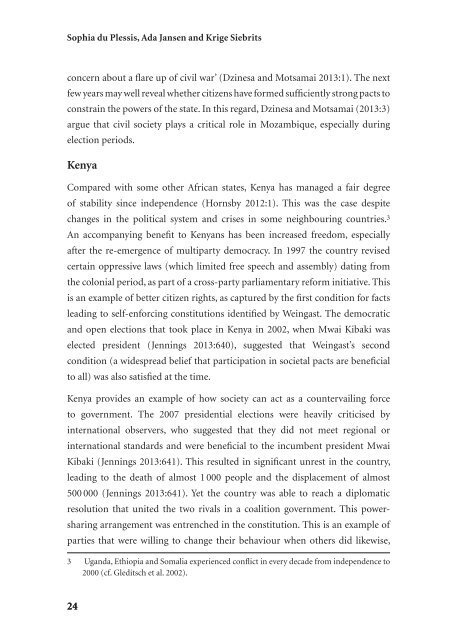ACCORD-ajcr-2015-1
ACCORD-ajcr-2015-1
ACCORD-ajcr-2015-1
- No tags were found...
Create successful ePaper yourself
Turn your PDF publications into a flip-book with our unique Google optimized e-Paper software.
Sophia du Plessis, Ada Jansen and Krige Siebrits<br />
concern about a flare up of civil war’ (Dzinesa and Motsamai 2013:1). The next<br />
few years may well reveal whether citizens have formed sufficiently strong pacts to<br />
constrain the powers of the state. In this regard, Dzinesa and Motsamai (2013:3)<br />
argue that civil society plays a critical role in Mozambique, especially during<br />
election periods.<br />
Kenya<br />
Compared with some other African states, Kenya has managed a fair degree<br />
of stability since independence (Hornsby 2012:1). This was the case despite<br />
changes in the political system and crises in some neighbouring countries. 3<br />
An accompanying benefit to Kenyans has been increased freedom, especially<br />
after the re-emergence of multiparty democracy. In 1997 the country revised<br />
certain oppressive laws (which limited free speech and assembly) dating from<br />
the colonial period, as part of a cross-party parliamentary reform initiative. This<br />
is an example of better citizen rights, as captured by the first condition for facts<br />
leading to self-enforcing constitutions identified by Weingast. The democratic<br />
and open elections that took place in Kenya in 2002, when Mwai Kibaki was<br />
elected president (Jennings 2013:640), suggested that Weingast’s second<br />
condition (a widespread belief that participation in societal pacts are beneficial<br />
to all) was also satisfied at the time.<br />
Kenya provides an example of how society can act as a countervailing force<br />
to government. The 2007 presidential elections were heavily criticised by<br />
international observers, who suggested that they did not meet regional or<br />
international standards and were beneficial to the incumbent president Mwai<br />
Kibaki (Jennings 2013:641). This resulted in significant unrest in the country,<br />
leading to the death of almost 1 000 people and the displacement of almost<br />
500 000 (Jennings 2013:641). Yet the country was able to reach a diplomatic<br />
resolution that united the two rivals in a coalition government. This powersharing<br />
arrangement was entrenched in the constitution. This is an example of<br />
parties that were willing to change their behaviour when others did likewise,<br />
3 Uganda, Ethiopia and Somalia experienced conflict in every decade from independence to<br />
2000 (cf. Gleditsch et al. 2002).<br />
24


